TTM Technologies Bundle
Who Really Controls TTM Technologies?
Understanding the TTM Technologies SWOT Analysis is crucial, but have you ever wondered who truly steers the ship at TTM Technologies? Knowing the TTM Technologies ownership structure provides critical insights into its strategic decisions and market performance. From its roots as a PCB manufacturer to its current status as a global tech leader, the evolution of TTM's ownership tells a compelling story.
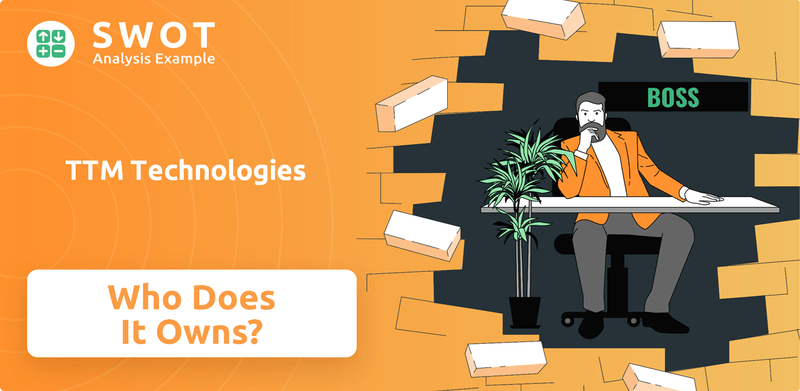
Delving into TTM Technologies ownership reveals a fascinating journey from its founding by Kent Alder to its current position as a publicly traded entity. This exploration of TTM Technologies ownership structure will examine the key players, including major shareholders and the board of directors, providing a comprehensive view of who owns TTM. We'll also explore the TTM Technologies parent company and how its ownership has influenced its growth and strategic direction, offering valuable insights for investors and industry watchers alike.
Who Founded TTM Technologies?
The origins of TTM Technologies, a significant player in the printed circuit board (PCB) industry, trace back to 1998. The company's foundation was laid by Kent Alder, who initiated the venture through the acquisition of Pacific Circuits, Inc., located in Redmond, Washington.
Alder's experience in the PCB sector, including his previous roles at Lundahl Astro Circuits, Inc., and ElectroStar, Inc., was instrumental in shaping TTM's strategic direction. He envisioned TTM as a solution focused on 'time-to-market' manufacturing, a critical aspect of the industry.
While the specifics of the initial equity distribution among founders and early investors remain undisclosed, Alder's role as the sole founder suggests a substantial initial stake and control at the company's inception. The company's early focus on rapid PCB manufacturing services set the stage for its future growth.
In 1999, TTM Technologies expanded its presence through the acquisition of Power Circuits, Inc.
This acquisition also led to the relocation of its headquarters to Santa Ana, California.
The company's early business centered on manufacturing PCBs for routers, switches, servers, and memory modules.
Early customers included General Electric, Motorola, and Solectron.
The founding team's vision of providing quick-turn, high-technology PCB manufacturing services was central to its early operations and growth.
This laid the groundwork for its future expansion and eventual public offering.
Understanding the initial ownership and the company's early strategic moves provides context for its later development. The company's focus on rapid PCB manufacturing was a key differentiator. For further insights into the competitive landscape, you can explore the Competitors Landscape of TTM Technologies.
- Who owns TTM Technologies: Kent Alder was the founder and likely held a significant initial stake.
- TTM Technologies ownership structure: The company's early structure was centered around Alder's leadership.
- TTM Technologies company profile: Focused on time-to-market PCB manufacturing.
- TTM Technologies stock: The company's early growth set the stage for its eventual public offering.
TTM Technologies SWOT Analysis
- Complete SWOT Breakdown
- Fully Customizable
- Editable in Excel & Word
- Professional Formatting
- Investor-Ready Format
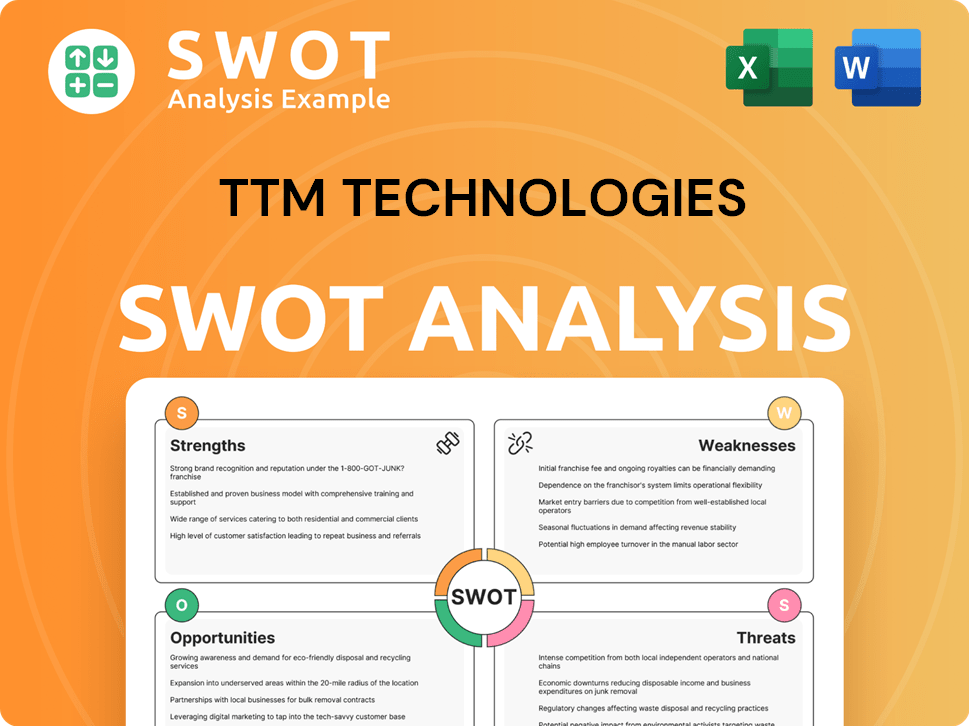
How Has TTM Technologies’s Ownership Changed Over Time?
The evolution of TTM Technologies' ownership structure began with its initial public offering (IPO) in 2000 on the Nasdaq. This IPO, which involved the sale of 7.5 million shares, raised $120 million and resulted in a market capitalization of $568.8 million. The IPO marked a shift from private ownership to a structure that included public shareholders, significantly altering the company's ownership landscape.
The ownership of TTM Technologies has transformed since its IPO. As of March 2025, institutional investors hold a large majority of the company's stock. This shift reflects the company's growth and its appeal to large financial organizations. These institutional investors significantly influence the company's strategy and governance due to their collective voting power and investment objectives.
| Ownership Category | Percentage of Shares | Approximate Shares Held (as of March 2025) |
|---|---|---|
| Institutional Investors | 88.11% | |
| Insiders | 1.78% | |
| Public Companies and Individual Investors | 10.11% |
Key institutional investors include BlackRock, Inc. (17.37%), Vanguard Group Inc. (13.05%), Dimensional Fund Advisors LP (6.95%), and State Street Corp (4.00%). Hsiang Chien Tang is the largest individual shareholder, owning 38.32% of the company. This ownership structure highlights the influence of institutional investors on the company's direction and the significant stake held by individual shareholders.
TTM Technologies' ownership structure is primarily dominated by institutional investors, reflecting strong market confidence.
- The IPO in 2000 was a pivotal event, broadening the ownership base.
- Institutional investors hold approximately 88.11% of the company's stock as of March 2025.
- Hsiang Chien Tang is the largest individual shareholder, with 38.32% ownership.
- The ownership structure influences company strategy and governance.
TTM Technologies PESTLE Analysis
- Covers All 6 PESTLE Categories
- No Research Needed – Save Hours of Work
- Built by Experts, Trusted by Consultants
- Instant Download, Ready to Use
- 100% Editable, Fully Customizable
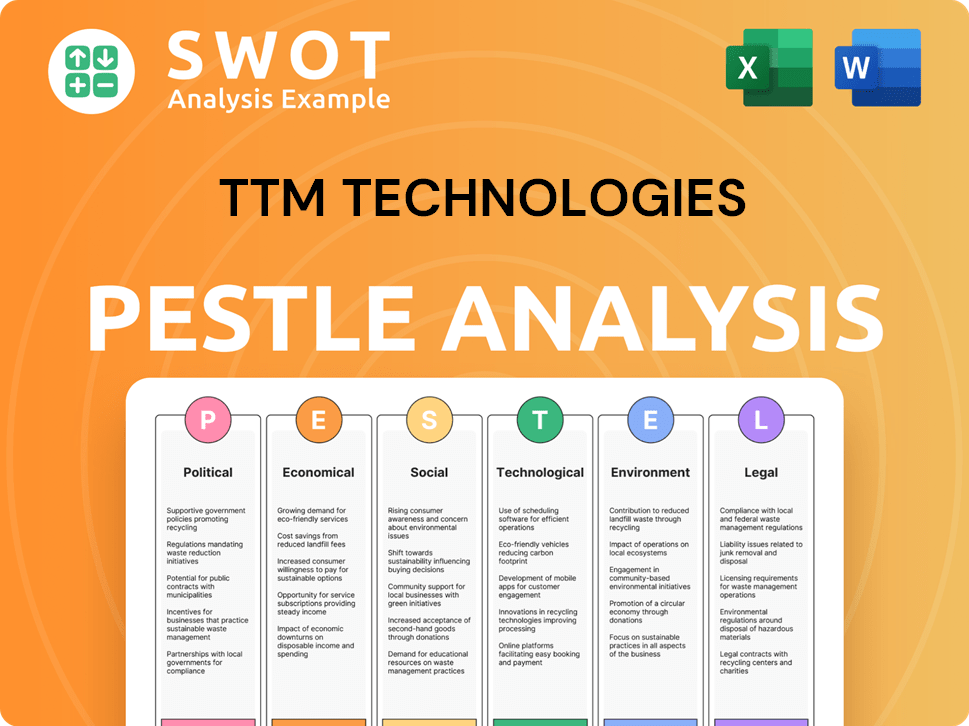
Who Sits on TTM Technologies’s Board?
The current board of directors at TTM Technologies oversees the company's strategic direction and ensures effective corporate governance. The board is structured to include a mix of inside and independent directors. As of May 2024, the board included key members such as Rex D. Geveden (Chairman), Wajid Ali, Thomas T. Edman (President and CEO), Julie S. England, Philip G. Franklin, Pamela B. Jackson, Chantel E. Lenard, and John G. Mayer. The board's composition is designed to meet the standards set by the SEC and Nasdaq, with a majority of independent directors.
The board's structure reflects a commitment to aligning the interests of the directors with those of the stockholders. Independent directors are expected to hold shares valued at least three times their annual retainer, as per the company's corporate governance guidelines. The recent appointment of Wajid Ali to the Board of Directors, effective May 10, 2024, demonstrates an ongoing evolution of the board's composition.
| Board Member | Position | Date Joined |
|---|---|---|
| Rex D. Geveden | Chairman | N/A |
| Wajid Ali | Director | May 10, 2024 |
| Thomas T. Edman | President and CEO | N/A |
| Julie S. England | Director | N/A |
| Philip G. Franklin | Director | N/A |
| Pamela B. Jackson | Director | N/A |
| Chantel E. Lenard | Director | N/A |
| John G. Mayer | Director | N/A |
The voting structure for TTM Technologies' common stock is straightforward: one-share-one-vote on all matters submitted to a vote of stockholders. This simple structure ensures that each share of common stock has equal voting power. The company's common stock is the only class of securities registered under Section 12 of the Securities Exchange Act of 1934, as of December 28, 2020. In May 2025, the retirement of Kent Alder, the founder and former CEO, from the board marked a significant transition in the company's leadership.
The board of directors at TTM Technologies includes a mix of inside and independent directors, ensuring diverse perspectives and adherence to governance standards. The voting structure is simple, with one-share-one-vote, providing clarity for investors. The company's governance emphasizes aligning director interests with those of stockholders through equity ownership.
- The board is required to have a majority of independent directors.
- Directors are elected by a plurality of the votes cast.
- Independent directors are expected to own shares valued at least three times their annual retainer.
- The company has only one class of securities registered under Section 12 of the Securities Exchange Act of 1934: its common stock.
TTM Technologies Business Model Canvas
- Complete 9-Block Business Model Canvas
- Effortlessly Communicate Your Business Strategy
- Investor-Ready BMC Format
- 100% Editable and Customizable
- Clear and Structured Layout
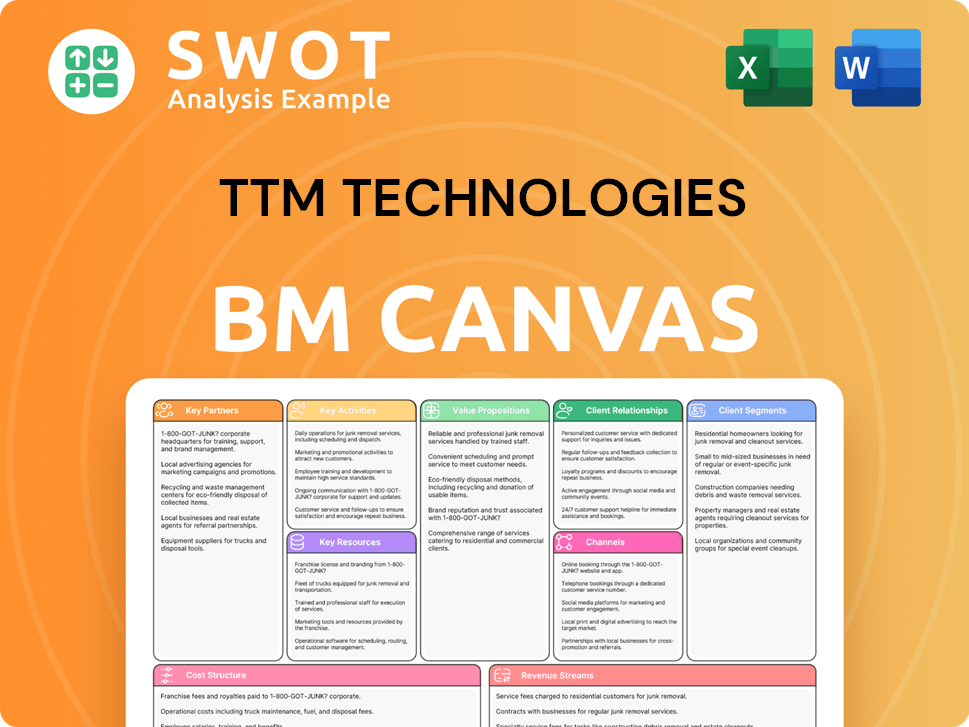
What Recent Changes Have Shaped TTM Technologies’s Ownership Landscape?
Over the past few years, TTM Technologies has seen changes in its ownership and strategic direction. In 2020, the company sold its mobile device business unit in China and closed a commercial assembly business unit. In 2022, TTM acquired Telephonics Corporation, expanding its presence in the aerospace and defense sector.
Institutional investors continue to hold a significant portion of TTM Technologies stock. As of March 2025, they owned approximately 88.11% of the company. Insider trading activity has shown some selling by insiders. Insider holdings decreased from 2.51% to 2.42% in March 2025. The Board of Directors authorized a $100 million share buyback program in May 2025.
| Metric | Value | Year |
|---|---|---|
| Net Sales | Approximately $2.4 billion | Fiscal Year 2024 |
| Aerospace and Defense Backlog | $1.56 billion | 2024 |
| Data Center Computing Revenue | 22% of total revenue | 2024 |
| Institutional Ownership | Approximately 88.11% | March 2025 |
| Insider Holdings | 2.42% | March 2025 |
| Share Buyback Program | $100 million | Authorized May 2025 |
In May 2025, Tom Clapprood sold 10,000 shares for $295,000, and Daniel Weber sold shares for $595,217. The company expects to complete the closure of its Huntington facility by mid-2025, resulting in a total of 22 facilities worldwide. The average one-year price target for TTM Technologies is $35.70.
Institutional ownership remains dominant, representing a significant portion of TTM Technologies' stock. Insider selling has been observed recently, with holdings slightly decreasing.
TTM Technologies reported around $2.4 billion in net sales for fiscal year 2024. The aerospace and defense sector continues to be strong, with data center computing revenues also growing significantly.
The company is closing its Huntington facility by mid-2025. TTM Technologies' Board of Directors authorized a $100 million share buyback program in May 2025.
The company anticipates Q1 2025 revenues to be between $600 million and $640 million. The average one-year price target for TTM Technologies is $35.70.
TTM Technologies Porter's Five Forces Analysis
- Covers All 5 Competitive Forces in Detail
- Structured for Consultants, Students, and Founders
- 100% Editable in Microsoft Word & Excel
- Instant Digital Download – Use Immediately
- Compatible with Mac & PC – Fully Unlocked
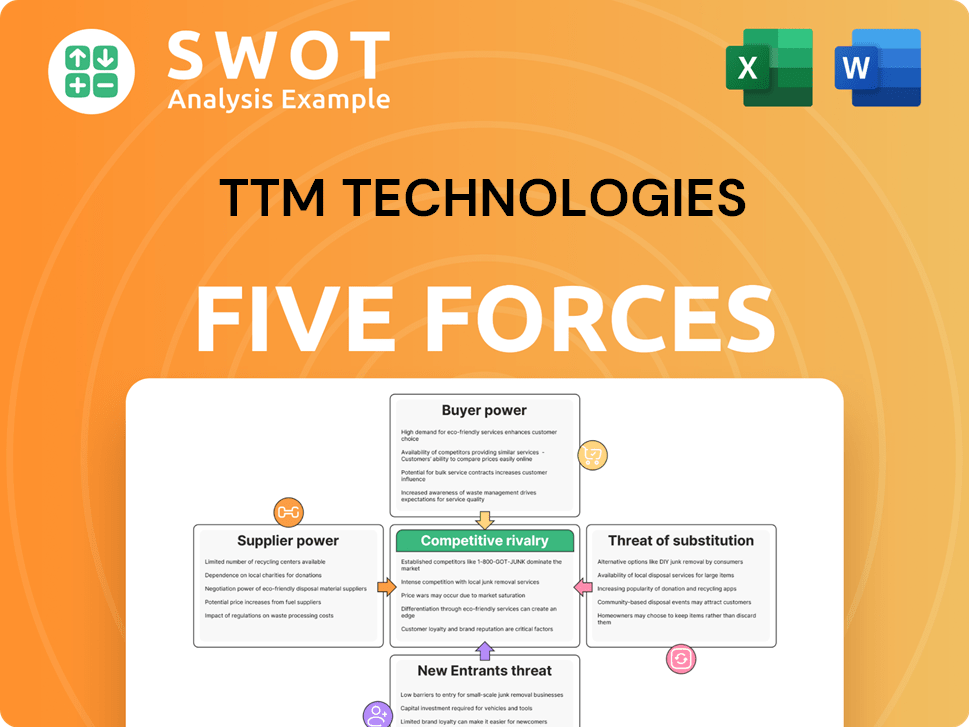
Related Blogs
- What are Mission Vision & Core Values of TTM Technologies Company?
- What is Competitive Landscape of TTM Technologies Company?
- What is Growth Strategy and Future Prospects of TTM Technologies Company?
- How Does TTM Technologies Company Work?
- What is Sales and Marketing Strategy of TTM Technologies Company?
- What is Brief History of TTM Technologies Company?
- What is Customer Demographics and Target Market of TTM Technologies Company?
Disclaimer
All information, articles, and product details provided on this website are for general informational and educational purposes only. We do not claim any ownership over, nor do we intend to infringe upon, any trademarks, copyrights, logos, brand names, or other intellectual property mentioned or depicted on this site. Such intellectual property remains the property of its respective owners, and any references here are made solely for identification or informational purposes, without implying any affiliation, endorsement, or partnership.
We make no representations or warranties, express or implied, regarding the accuracy, completeness, or suitability of any content or products presented. Nothing on this website should be construed as legal, tax, investment, financial, medical, or other professional advice. In addition, no part of this site—including articles or product references—constitutes a solicitation, recommendation, endorsement, advertisement, or offer to buy or sell any securities, franchises, or other financial instruments, particularly in jurisdictions where such activity would be unlawful.
All content is of a general nature and may not address the specific circumstances of any individual or entity. It is not a substitute for professional advice or services. Any actions you take based on the information provided here are strictly at your own risk. You accept full responsibility for any decisions or outcomes arising from your use of this website and agree to release us from any liability in connection with your use of, or reliance upon, the content or products found herein.